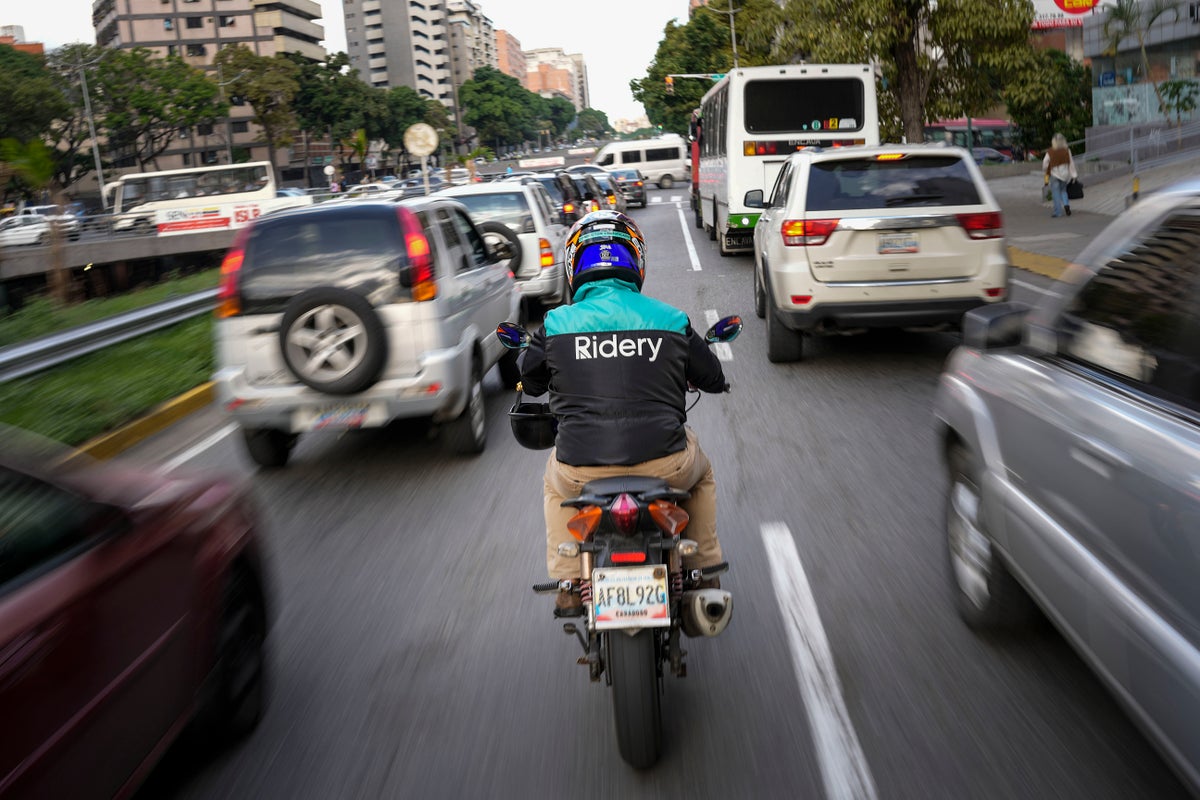
Ride-sharing apps like Uber, DiDi and Lyft may have driven across much of the globe, but they haven't yet rolled into Venezuela, where U.S. sanctions and years of hyperinflation and other woes made it difficult to operate.
So a handful of local entrepreneurs have started their own ride-sharing apps — and appear to be finding a welcome from customers frustrated by scarce taxis, aging buses and a decrepit subway system.
Department store buyer Maria Arreaza, 39, had long depended on public transportation to reach her downtown office and was intrigued by advertisements for the new Ridery app, though initially skeptical.
"I said, ‘Well, I’m going to do a test.’ I made a request for a service and the application seemed super friendly. I kept trying, I asked for more services ... (and) so I became a high-frequency user.”
So much so that when her mother spent almost two months hospitalized due to COVID-19, she requested at least four rides a day to the hospital and then home or to work.
Ridery is one of at least three three Venezuelan ride-sharing apps that launched during the pandemic — and which have taken advantage of a de facto switch of currencies from the Venezuelan bolivar to the U.S. dollar that has helped rein in years of skyrocketing inflation. The new services set their prices in dollars and allow riders to pay with bank cards or transfer services rather than bills.
Public transportation across the country is a mix of public and private ventures, all of which have been on the decline. Some of the buses around Caracas are so old they have earned nicknames like “The Immortal,” while others have proven all too mortal due to a lack of parts or maintenance.
Portions of the city’s subway system are often out of service. Meanwhile, fewer taxi stands operate around the city after years of hyperinflation and outward migration obliterated much of the middle class that patronized them.
Pickpocketing, sweat and noxious fumes are common at the street-level and underground transportation.
All also struggle with payment methods, in part due to the scarcity of bolivars. The public system does not accept foreign currency and private operators cannot easily give people change when the fare does not round up to amounts matching dollar bills: Quarters, dimes and nickels are not in circulation.
And in a country where suspicion and distrust abound, the information the apps provide on the driver, vehicle, price and route has attracted consumers.
“Everyone told us that we were crazy, that nobody here was going to get in a car with a stranger, and that’s why we launched with our own investment ... seeing what was going to happen,” said Gerson Gomez, CEO and co-founder of Ridery, which launched in March 2021.
“Delivery applications were already beginning to scale up in Venezuela. Dollarization had allowed the common transactional means of e-commerce, such as credit cards, to be really accepted in Venezuela, and also ... you’d hear from many people that the city is a little safer.”
The app now operates in 12 cities and sees 400,00 rides a month with 12,000 drivers, according to the company.
It's chief competitor, Yummy, which launched in 2020 as a delivery app and later expanded into ride-sharing, did not respond to an interview request.
The apps services, however, are not within everyone's reach. The country’s monthly minimum wage is $30. Average monthly salaries in the private sector are less than $100. So even a $3 ride of a few miles can be a big portion of many budgets.
Gerzon said drivers earn an average of more than $700 a month, before expenses such as gasoline and maintenance. He added he thinks ride-share and delivery apps help even those who don't use them.
“If a person who is working at your store and earns $50 tells you that he is going to leave because he is going to work in delivery with a motorcycle that a cousin is going to lend him and he is going to earn $400 a month, you are forced to increase the salary,” Gerzon said. “I think that these applications have helped in the cities, where they are drive up wages a little.”
Rides on the apps tend to be cheaper than taxicab prices, though so far they haven't prompted the sort of large-scale protests seen from cab drivers in other countries.
And some drivers say they haven't seen the sort of profits they had expected.
After seeing ads on social media, William Devia passed the vehicle inspection and interview to become a driver for an app in October. He has been a cab driver for 10 years, and since taxis in Caracas are marked only by roof lights — no special paint schemes or additional signage — he figured he could give the app a try.
A few rides in, Devia, 33, determined it was not going to work out.
“The customer will always look for the cheapest,” Devia said. “Everyone takes care of their own wallet. It wasn’t profitable because they (the apps) demand a lot — that the car doesn’t have a single scratch — for how little one is going to earn.”
But for Angel Altuve, the 10 rides he strives to get every day help him complement his $30 monthly pension. Altuve was laid off from his management-level job after 20 years because of the country's crisis.
“It depends on the day because there are times when there are only trips with a minimum rate. It’s a random thing,” Alduve, 60, said. “So, in those 10 trips I could maybe earn $20 with the net profit that I have left. But if the services go out to farther, more distant places, I could make maybe $45-$50.”







